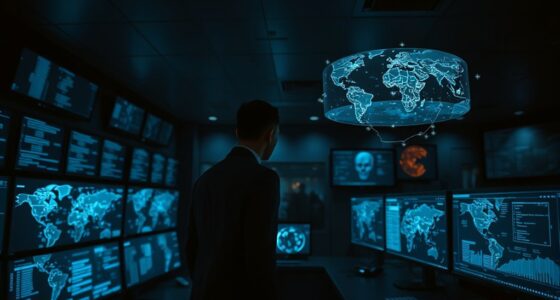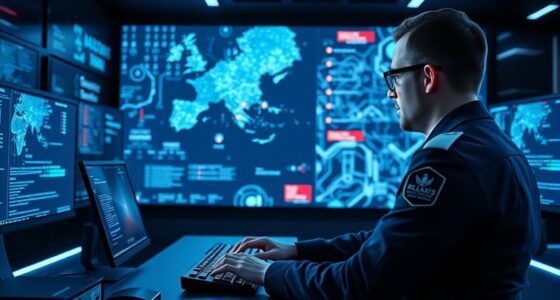Russia's GRU has transformed into a powerful player in cyber warfare by harnessing advanced AI technologies. Their cyber units deploy sophisticated tactics, exploiting vulnerabilities through phishing and malware while engaging in psychological operations and disinformation campaigns. This strategic use of AI enhances their offensive capabilities and decision-making processes, raising significant global security concerns. As you explore further, you'll discover how these operations unfold and their implications for global stability and the future of warfare.
Key Takeaways
- GRU cyber units leverage AI to enhance offensive operations, improving malware detection evasion and psychological warfare tactics.
- Advanced AI applications optimize military logistics, enabling faster decision-making and improved threat prediction during cyber operations.
- The integration of AI in Russian cyber warfare supports sophisticated disinformation campaigns aimed at destabilizing democratic institutions globally.
- GRU exploits AI-driven tools to disrupt critical infrastructure, posing significant risks to NATO nations and contributing to geopolitical tensions.
- As cyber capabilities evolve, the GRU's use of AI positions it as a formidable actor in modern cyber conflicts and warfare strategies.
Overview of GRU Cyber Units
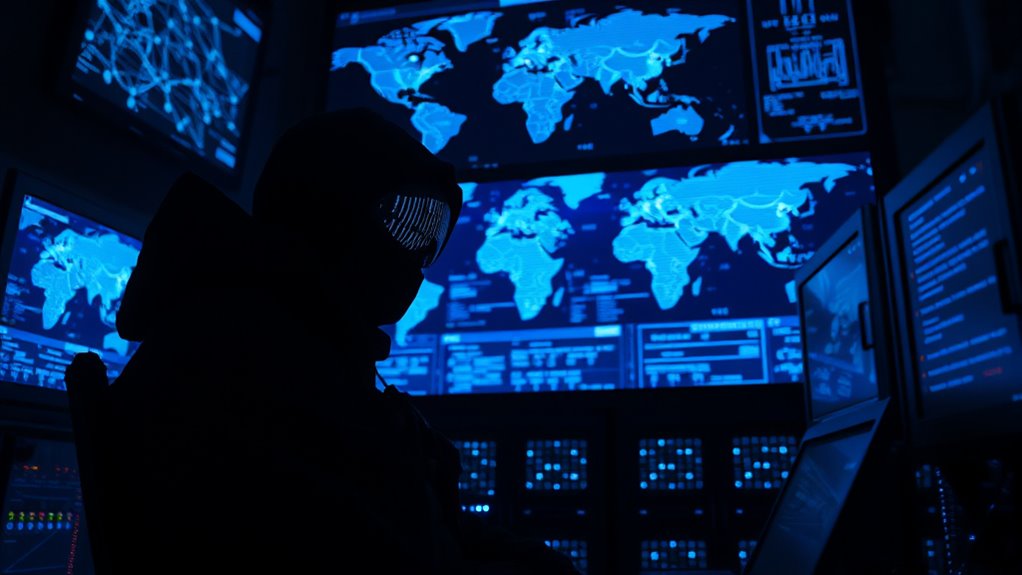
As the backbone of Russia's military intelligence operations, the GRU's cyber units play a crucial role in executing high-stakes cyber tactics.
Two primary units, Unit 74455 and Unit 54777, have gained notoriety for their distinct capabilities. Unit 74455 is known for its offensive cyber operations, most notably the NotPetya malware attack, while Unit 54777 specializes in psychological operations, including online disinformation campaigns. The GRU's deep-cover agents also contribute to these cyber efforts by providing valuable intelligence from within foreign nations.
The GRU also manages research institutes dedicated to developing advanced hacking tools and malware. These cyber units frequently collaborate with other Russian agencies, creating a fluid operational landscape that impacts multiple nations, such as Ukraine and the U.S. Their actions illustrate the GRU's significant influence in the realm of international cyber conflict.
Tactics Employed in Cyber Operations
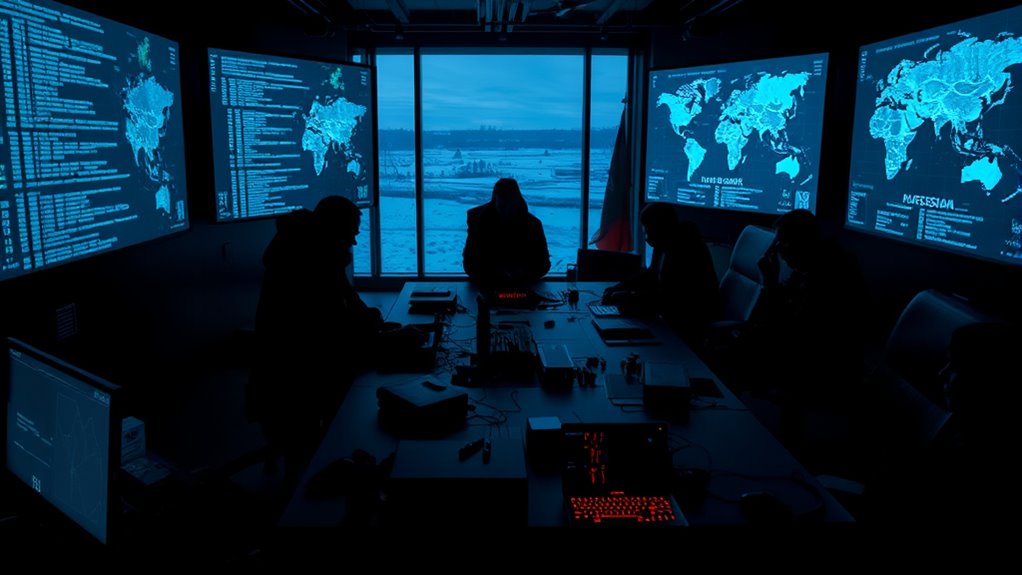
The GRU employs a variety of sophisticated tactics in its cyber operations that reflect its strategic objectives and technological prowess. You'll notice they often exploit compromised edge infrastructure, using phishing attacks to trick victims into revealing credentials. Once inside, they deploy advanced malware while employing built-in tools to minimize detection during reconnaissance and lateral movement. Techniques like Pass-the-Hash and WMI help them escalate privileges seamlessly. Disruption tactics include wiper malware and DDoS attacks via botnets, creating chaos. They also engage in psychological warfare, using disinformation campaigns and troll farms to manipulate public perception. Additionally, partnerships with non-state actors and the dark web enhance their operational capabilities, making their tactics both diverse and adaptive. This adaptability is further supported by their emphasis on deniability, which allows them to obscure their actions and avoid accountability.
The Role of AI in Modern Warfare
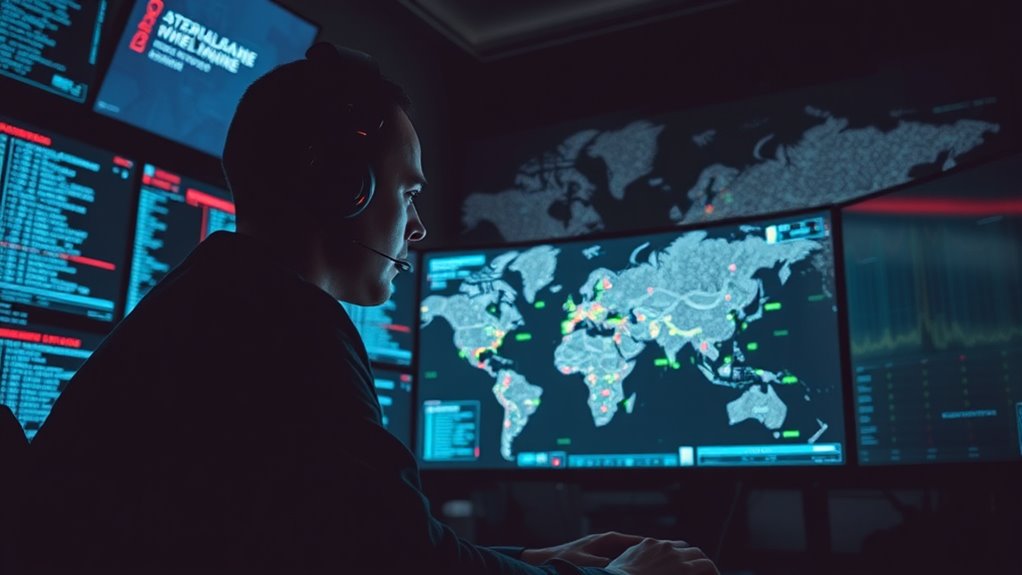
With the rapid evolution of technology, AI is reshaping the landscape of modern warfare in unprecedented ways. You'll notice that recent advancements enable sophisticated capabilities, like advanced object recognition and real-time data analysis, enhancing decision-making on the battlefield. Geopolitical rivalries, particularly between the U.S. and China, are driving massive investments in AI for military superiority. Conflicts like the one in Ukraine are accelerating the deployment of AI technologies beyond traditional superpowers. AI enhances intelligent weapons systems, improving target recognition and navigation while revolutionizing command and control. Additionally, AI optimizes logistics and predictive maintenance, ensuring military efficiency. Moreover, ongoing conflict in Ukraine has highlighted the urgent need for effective military AI applications. The race for AI dominance continues, with various nations seeking to leverage these technologies for tactical advantages.
Implications for Global Security
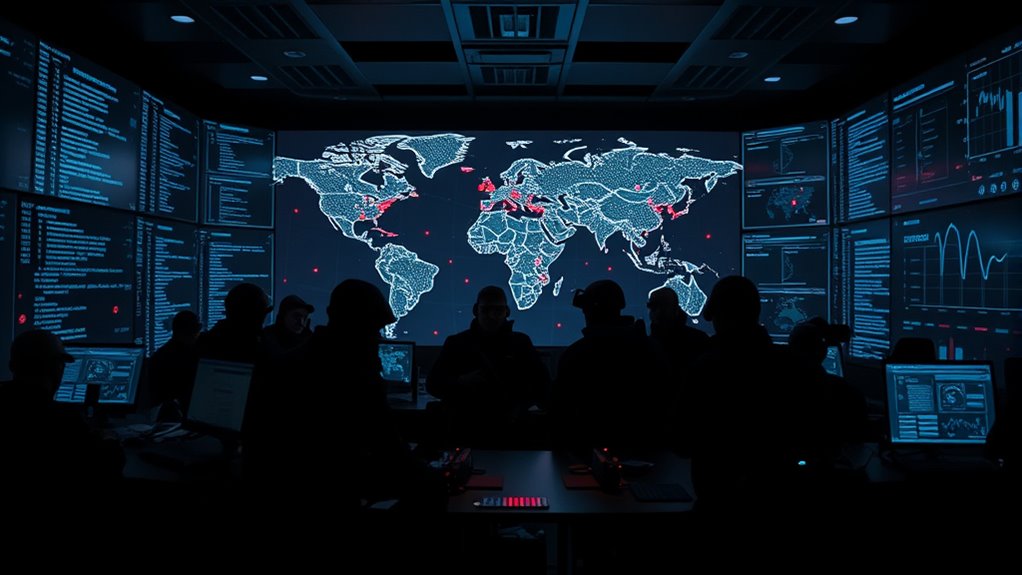
While AI-driven cyber operations from Russia's GRU pose significant risks, the implications for global security extend far beyond immediate threats. The targeting of critical infrastructure—like energy and healthcare—can disrupt essential services across NATO and beyond, creating chaos. With destructive malware deployed against Ukraine, the potential for widespread harm is clear. You must recognize the urgent need for enhanced cyber defenses and public-private collaboration to build resilience. Additionally, these operations aim to destabilize democratic institutions and fracture alliances, complicating international relations. Notably, Unit 29155's operations highlight the magnitude of the threat and the necessity for coordinated responses. As you consider these developments, it's crucial to adopt adaptive strategies, leveraging technology and cooperation to counter sophisticated attacks. The global landscape is changing, and you must stay vigilant against these emerging threats.
Historical Context of Russian Military Modernization
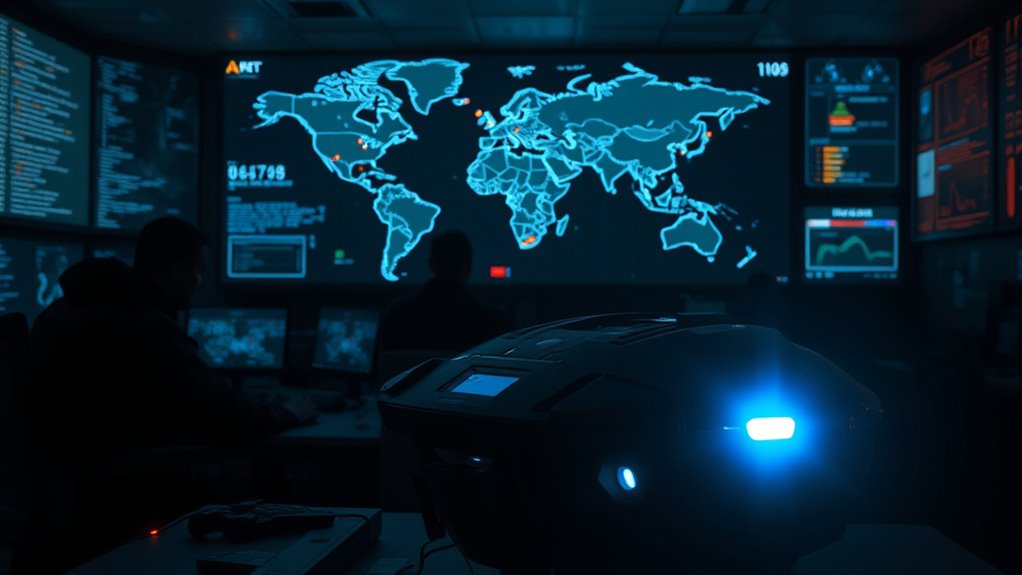
Since the 2008 invasion of Georgia, Russian military modernization has gained momentum, driven by a clear recognition of the need for structural reforms and technological upgrades. You'll notice that early efforts addressed poor combat readiness and outdated infrastructure stemming from the post-Soviet era. Financial constraints often led to upgrades of legacy systems rather than new designs. The "New Look" reforms, initiated by former Defense Minister Anatoly Serdyukov, aimed to streamline command structures and improve coordination. Guided by 10-year State Armament Plans, today's priorities focus on ground forces and aerospace upgrades. The increased professionalization of soldiers enhances combat readiness, while technological integration, especially in C4ISR and electronic warfare, is pivotal, reflecting the need to adapt to international military dynamics. Additionally, the military has increasingly recognized the importance of AI-enhanced cyberattacks as a vital component of modern warfare capabilities.
Cyber Operations in the Russo-Ukrainian War
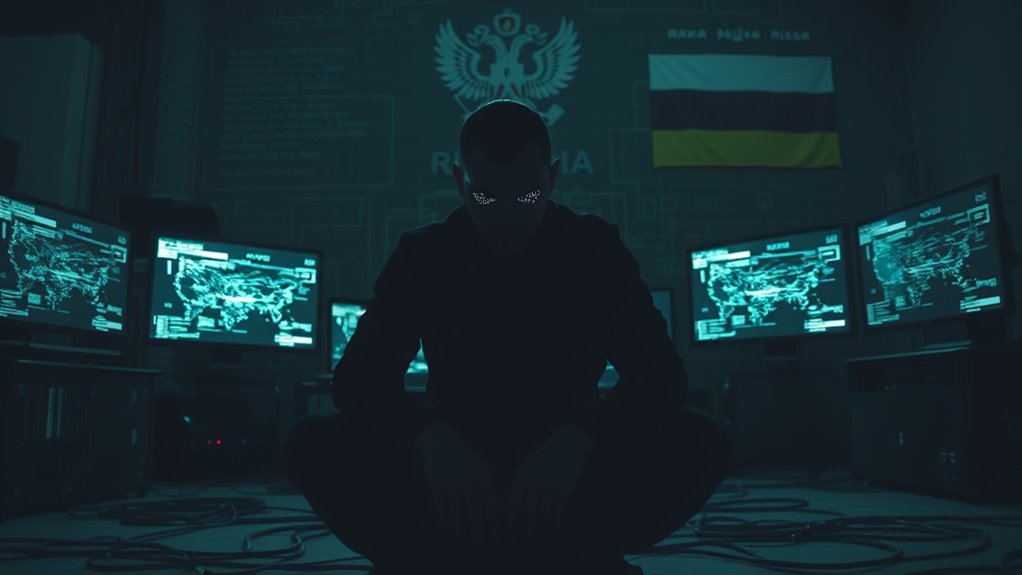
As the Russo-Ukrainian War unfolds, cyber operations have emerged as a critical front in the conflict, showcasing the GRU's formidable capabilities. You'll notice that Unit 29155 plays a pivotal role, launching attacks to disrupt Ukrainian command and control systems. The WhisperGate malware incident highlights their reach, impacting both Ukraine and NATO networks. With over 1,123 cyberattacks reported in early 2022, the frequency of these operations has surged. GRU's tactics adapt, focusing on frontline soldiers' devices and utilizing captured technology to exfiltrate data. Offensive cyber operations have become integral to military strategies, further amplifying the GRU's effectiveness in this digital battlefield. Their collaboration with cybercriminals enhances their offensive tools, while AI aids in analyzing stolen data, refining their strategies. These cyber efforts underscore the evolving nature of modern warfare.
Targeting Strategies and Patterns

Understanding the GRU's targeting strategies and patterns reveals a calculated approach to cyber warfare that maximizes disruption. They exploit compromised infrastructure for initial access, using built-in tools for reconnaissance and maintaining persistent access through group policy objects. Their focus on critical infrastructure, like energy providers, amplifies the impact of their attacks. By integrating AI, they enhance the precision and speed of their operations, utilizing over 15 malware variants and ransomware as disruptive tools. Russian cyberattacks have been a consistent aspect of the conflict in Ukraine, highlighting the ongoing nature of their cyber warfare tactics. Psychological warfare plays a role too, influencing public perception through disinformation. On-site operations by GRU Unit 26165 add a layer of complexity, allowing them to engage directly when remote access falls short, raising significant security concerns for targeted entities.
Economic and Political Ramifications of Cyber Attacks
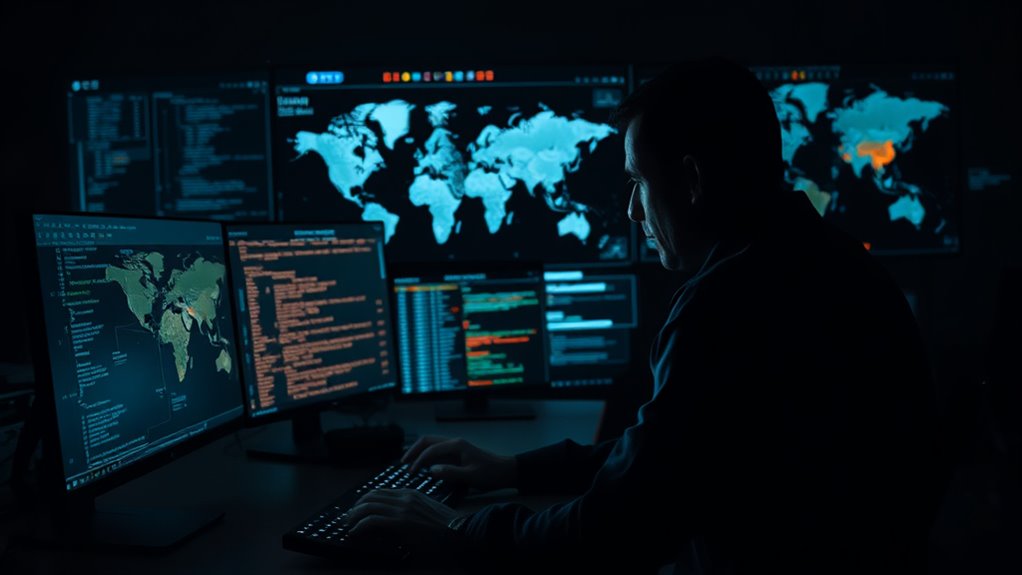
The economic and political ramifications of cyber attacks are profound, affecting everything from market stability to national security.
You mightn't realize that firms typically lose around 1.1% of their market value after an attack, while sales growth can drop by 3.2 percentage points. With global cybercrime costs projected to hit $10.5 trillion by 2025, the financial strain is immense. Additionally, firms in retail experienced a significant 5.4 percentage point decline in sales growth after an attack, illustrating the far-reaching impacts on specific sectors.
Politically, cyber aggression, especially from state actors like Russia, heightens geopolitical tensions and threatens national security. This instability necessitates stronger international cooperation to counter these threats.
As firms enhance cybersecurity measures, the long-term consequences—like reputational damage and cash flow volatility—become increasingly relevant, influencing both economies and political landscapes.
Future Directions for Russian Cyber Warfare

With the rising tide of cyber threats, Russian cyber warfare is evolving rapidly. You'll notice the shift from basic attacks to sophisticated operations, leveraging AI for both offense and defense. As Russia adapts, it's likely to enhance its cyber command structure, focusing on intelligence gathering and information warfare to support its military objectives. Despite facing technological challenges and international isolation, Russia may experiment with coordinated short bursts of cyber attacks to amplify traditional military efforts. However, the limited impact of current cyber operations in Ukraine shows that these strategies must be refined. Expect the integration of AI to continue, enabling Russia to predict threats and manage vulnerabilities more effectively, positioning it as a formidable cyber power in the years ahead. Current Russian cyber capabilities can disrupt adversary command and control systems without conventional military engagement, showcasing the potential of their cyber warfare strategies.
Frequently Asked Questions
What Specific Tools Does the GRU Use for Cyber Operations?
The GRU employs a variety of tools for its cyber operations.
You'll find infamous malware like Chisel, which targets Android devices for persistent access. They also modify legitimate software, such as Dropbear SSH, to maintain remote access.
Their operations often utilize the Tor network for anonymity, and they frequently deploy wipers and other disruptive tools to achieve their objectives.
This adaptability lets them target diverse environments effectively.
How Does GRU Cyber Warfare Differ From Other Nations' Strategies?
Did you know that over 80% of cyberattacks are linked to state-sponsored actors?
When you compare GRU's cyber warfare to other nations, you'll notice they uniquely integrate traditional military tactics with cyber strategies. They prioritize multi-agency coordination, enabling them to execute complex operations swiftly.
Unlike many, they often use hacktivist personas to obscure attribution, creating confusion and amplifying disruption. This adaptability and sophistication give them a distinct edge in the cyber domain.
What Measures Can Organizations Take to Defend Against GRU Attacks?
To defend against attacks, you should prioritize patching known vulnerabilities and conduct regular automated scans to assess your network.
Ensure sensitive data is securely stored and monitor systems continuously for abnormal activity.
Strengthen your network by limiting access to internet-facing devices and securing Active Directory.
Leverage AI for enhanced threat detection and implement public-private partnerships to share intelligence.
Regular cybersecurity workshops can also help educate your team on best practices.
Are There Known GRU Operatives or Hackers Linked to Specific Attacks?
Picture a shadowy figure lurking in the digital alleyways; that's the essence of known GRU operatives like Vladislav Borovkov and Denis Denisenko.
They've been linked to specific attacks, such as WhisperGate and HermeticWiper malware, aimed at critical infrastructure. Their actions have sent ripples through NATO and EU countries.
As you navigate this cyber landscape, understanding these operatives helps you better defend against their malicious tactics. Awareness is your first line of defense.
How Does Public Perception Influence Gru's Cyber Operations and Tactics?
Public perception shapes your understanding of cyber operations significantly.
When you see narratives crafted around attacks, it amplifies their impact in your mind. If you notice exaggerated claims of success, it influences how you view a group's capabilities.
Disinformation campaigns create confusion, and that uncertainty can make you question your trust in institutions.
Ultimately, how you perceive these activities can affect your response and shape the broader narrative around these cyber operations.
Conclusion
As you navigate the turbulent waters of modern warfare, remember that Russia's GRU is like a cunning chess player, always three moves ahead. With AI-enhanced strategies, they manipulate the digital landscape, creating chaos that can destabilize nations. Just as a masterful chess game unfolds, each cyber operation is a calculated risk, demonstrating the chilling reality that the battlefield now extends beyond borders and into our screens. The stakes are high, and the game is far from over.



